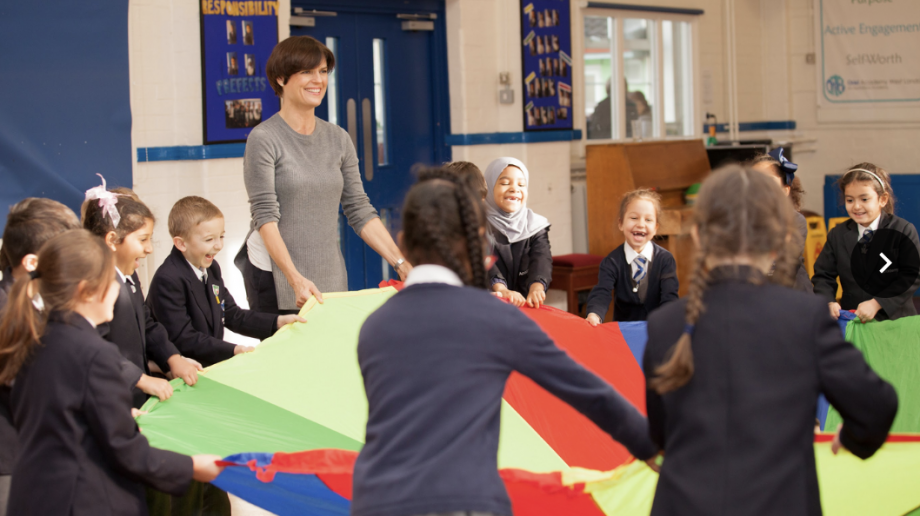
Making play a priority after lockdown
Playtime in schools has been identified as a vital opportunity to support children’s recovery from the Covid-19 lockdown. So despite pressure to increase classroom time for catch-up learning, schools need to continue to support and value the role
Written by Thérèse Hoyle, author, 101 Playground Games
In these uncertain times, play has become a hot talking point, not only amongst educators but with parents too. With additional pressure on schools to ‘catch up’ their pupils academically following the pandemic, increasing numbers of education professionals are concerned that the often overlooked idea of ‘play’ will be further neglected which could be detrimental to children’s emotional, social and academic development in the long term.
With my background as an early year’s teacher, knowing the value of play and seeing a trend emerging where play was pushed further into the sidelines, it’s what has inspired me to delve deeper into ‘play’ in my work as an educational consultant and founder of the Positive Playtime Programme and has influenced my latest book 101 Playground Games.
During the COVID-19 pandemic there has been a vast amount of research into the effects of the pandemic on children, both developmentally and physically. Notably play is a common theme that runs throughout the findings. There are three main factors that have impacted children’s physical and mental health: being confined to their homes, lack of outdoor activities and play. This is further compounded by the statistic that one in eight households in the UK do not have access to a private or shared garden (Ordnance Survey (OS) map data (May 2020).
Concerningly, Save the Children reported that 92 per cent of children felt that the way they play had changed since the COVID pandemic, this includes 51 per cent saying they play outside with their friends less, with 34 per cent playing alone more regularly. Twenty-three per cent stated that they are playing less sport than they were before.
Why encourage children to play games?
It is evident to us all that play and playing games is beneficial to a child’s wellbeing. Play England (2021) describes play as ‘an essential part of every child’s life and is vital for the enjoyment of childhood as well as social, emotional, intellectual and physical development.’ Furthermore, in a recent clinical report, ‘The Power of Play,’ from The American Academy of Pediatrics (AAP) (2018) comments on the importance of play and states, “the importance of playful learning for children cannot be overemphasized.”
According to the AAP, play is not frivolous, rather play is “vital for brain building,” and a central part of healthy child development. A key to executive function skills, “play allows for increased cognitive functioning/improving academic skills, relationships (social-emotional resilience) and helps children, “buffer toxic stress.” The report recommends that doctors write a prescription for play because ‘play is fundamentally important for developing a suite of 21st century skills, including social, emotional, language and cognitive skills, all needed by the next generation in an economically competitive world that requires collaboration and innovation.’
This report also states, ‘the most powerful way children learn isn’t only in classrooms or libraries but rather on playgrounds and in playrooms.’ It goes on to say that ‘Educators, pediatricians and families should advocate for and protect play and playful learning in preschools and schools because of its numerous benefits.’
Protecting play
We would advocate and protect other elements of our education system, so why shouldn’t we protect and advocate for play too?
Over my time of working with schools, I have discovered that children just want to have fun and are eager to play and learn new games. Once I start a game, I almost always have the whole school joining in. Games have the capacity to be hugely inclusive of all children, no matter what age, culture, race, creed, or ability. They offer opportunities for everyone in the school playground to get involved. Le Fevre (2007) comments that, ‘Games create a universal language with which people can relate to each other.’ We know from research that when children have a happy playtime, they learn better in the afternoon.
An added bonus I continue to hear from schools is how much happier their lunchtime supervisors, teaching assistants and teachers are, walking calmly into the staff room after play commenting on their happy playtime, so it’s not just the children who benefit – we all do! That’s what inspired me to write my latest book, 101 Playground Games 2nd Edition because wellbeing is important for us all.
We ignore play at our peril
Currently play isn’t prioritised enough in our education system as schools face continued pressure to ‘catch up’ children of all ages. Panksepp (1993), a neuroscientist and psychologist, says ‘We ignore play at our peril. Research shows that if infants don’t get enough socially interactive play, they will make up for lost time and play harder, often at the wrong times.’ In other words, their play impulse comes out inappropriately.
If children don’t get enough play they also end up with what Stuart Brown (2010) describes as a ‘serious play deficit, much like the well documented sleep deficit,’ which subsequently impacts social, emotional, mental and physical health and wellbeing.
The benefits of play
What is noticeable when I am outside playing games with children is the freedom that children experience to really be themselves and the incredible joy that games bring. There is evidence that by making children feel brighter and happier, games can prevent illness. Studies now show that prolonged dark feelings actually harm the body and cause disease. Psychologist Dr Robert Holden states, ‘The child who does not play, runs the risk of serious setbacks in life. This setback will manifest itself, physically, emotionally, mentally, and spiritually. Play can be a natural therapy, a medicine and a natural healer that promotes humour, happiness and wholeness. An absence of fun, little or no playtime and a lack of laughter are common symptoms of stress, sickness, and disease.
Little or no time for play can also be a significant cause of illness and disharmony. On the other hand, frequent prescriptions of play can inspire rest, relaxation and recovery. Play is also an act of ‘re-creation’. Through play we can recharge, revitalise and re-energise ourselves back into life.’
How to make playing a priority?
In our current school system, children have a morning playtime, lunchtime break and if they are lucky an afternoon playtime. Anthony Pellegrini, a professor of early childhood education, suggests more frequent breaks, such as those in Finland where students have a 15-minute outdoor free-play break every hour of every single school day (regardless of the weather) until high school. Perhaps longer play times should be a new consideration for us all?
During the years that I have run Positive Playtime training courses, a frequent cry from teachers and lunchtime supervisors has been that children just don’t know how to play and that they no longer play the old traditional games that we used to play. They say, ‘it wasn’t like this in our day, children knew how to play. We played street games, the roads were safe, and we didn’t have screens!’
Therefore, it is crucial in our world today, that as educators, we continue to support and value the role of play. It is also vital that we remind children to play old games and teach and encourage them how to play new ones. I believe that many games are not lost, only forgotten, and that with a little help and support from us in teaching games, we will reignite the flame in our children and they will thus pass these games on to the next generation.
Lots of play can be facilitated equipment free including playground games. You can even use your Sports Premium funding to support your school in creating active playtimes. When you are implementing games within your school there are no hard and fast rules. Feel empowered to change and adapt the activities in ways that work best for you and the children. I can almost guarantee that they will come up with interesting and creative ideas and additional rules and rhymes that adults haven’t even heard of.
Here’s some games you might like to try in your school. Download 10 free traditional playground games taken from 101 Playground Games here.
As we emerge out of this pandemic it is important to remember that our children spend 20 per cent of their school day in the playground. That’s one day a week spent playing. On my courses I encourage school leaders to include the development of outdoor play and learning in their school development plans so that we make play and child wellbeing a priority.
Please join our movement to make play a priority in the school day - #playmatters2021
Therese is the best-selling author of 101 Playground Games 2nd Edition and 101 Wet Playtime Games and Activities. She runs Positive Playtime and How to be a Lunchtime Superhero programmes in person and online, nationally and internationally.
This article includes sections from 101 Playground Games. Save 20 per cent through the Routledge website with discount code APR20.
Latest News
27/01/2026 - 10:04
The government is running a tender for industry to co-create AI tutoring tools with teachers, with the goal of bringing these tools to a similar level of quality of personalised one to one support.
26/01/2026 - 10:40
The proposed Scottish Budget for 2026-27 commits up to £200 million to the Scottish Attainment Challenge.
26/01/2026 - 10:24
The Welsh Government has set out the key challenges facing tertiary education in Wales and has launched a call for evidence to help address these challenges.
23/01/2026 - 10:47
Almost half (45%) of school leaders needed mental health and well-being support in just a year, a new survey from union NAHT has found.
22/01/2026 - 10:44
The film, ‘The Lunch They Deserve’, seeks to focus the nation on the need for better school food standards before the provision of Free School Meals is extended.







